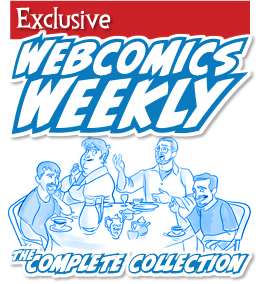The final reason to stop hosting reader comments
 Note: This post originally ran last year.
Note: This post originally ran last year.
In February 2015, I published a post that asked if webcomic creators really needed to host a comments section on their sites. By May of that year, I reported that I had curtailed commenting — and it had numerous positive side-effects for me. This release from NPR.org made it even more clear…
NPR is making an announcement today that is sure to upset a loyal core of its audience, those who comment online at NPR.org (including those who comment on this blog). As of Aug. 23, online comments, a feature of the site since 2008, will be disabled.
With the change, NPR joins a long list of other news organizations choosing to move conversations about its journalism off its own site and instead rely on social media to pick up the slack. But NPR stands for National Public Radio, so a decision to limit “public” input at NPR.org seems especially jarring.
The decision should not be taken to mean that NPR does not value audience engagement, said Scott Montgomery, managing editor for digital news. “We’ve been working on audience engagement, user connections, in a variety of ways, for many, many years, certainly going back to even before the internet. It is a part of public media. It’s important to us,” he told me.
But at this point, he argued, the audience itself has decided for NPR, choosing to engage much more via social media, primarily on Twitter and Facebook, rather than in the NPR.org comments section.
“We’ve reached the point where we’ve realized that there are other, better ways to achieve the same kind of community discussion around the issues we raise in our journalism,” he said, with money, and spending it efficiently, part of the issue. More than 5 million people each month engage with NPR on Twitter, compared to just a fraction of that number in the NPR.org comments. “In relative terms, as we set priorities, it becomes increasingly clear that the market has spoken. This is where people want to engage with us. So that’s what we’re going to emphasize,” he said.
Here’s an analysis of what that means to you…
 Living in the Post-Ad Age
Living in the Post-Ad Age
For starters, it’s yet another indication that we’re living in the Post-Ad Age. (I’ll say it again… if you’re still publishing webcomics the way it was done a few years ago, you’re making a big mistake.) Think about it. There’s two reasons to encourage reader comments — Community Building and Ad Revenue. Now that ad blockers have all but killed of anything but the most aggressive advertising, the ad revenue isn’t there to support it.
Back in the day, a webcartoonist could look at a flame war as it broke out on his or her forum and take solace in the fact that it was generating pageviews — and therefore, ad revenue. That’s not the case any more.
But what about Community Building?
I’d rather be in Philadelphia on Facebook
Your readers — the vast majority of them — are already spending the majority of their Web-related time on social media. And the overwhelming majority of that is spent on Twitter and Facebook. They’re there. They’re already talking. They’ve already built communities of their own.
If they talk about your comic on their social media, you gain in organic reach what you may have lost in ad revenue.
Put more simply, by encouraging these conversations to take place on social media, you increase word-of-mouth advertising. Do you lose control over the conversation? Maybe. A little.
But let’s face it. Few of us actually used our “control” when we hosted reader comments on our sites. And furthermore, the very act of maintaining a significant social-media presence means that we wield a certain amount of control based on what we choose to share and what we choose to ignore.
Here’s what I mean by that. First, if you’re doing the work you need to do on social media to promote your comic, you’re going to gain organic reach — that is, you can reach a large number of people without paying for an ad or promoted posts. In Twitter, that’s a large number of followers. For a Facebook Fan Page, that’s a large amount of Likes (that you didn’t pay for).
So, when a fan initiates a conversation on social media that you would like to amplify, your retweet or share will do so nicely. And when there’s someone crabbing about something you’d just as soon see drift to the bottom of the social-media sediment, you can simply ignore it. Unless that person has an organic reach that rivals your own, it will die its own natural death.
And, of course, you can encourage — and participate in — the commentary that accompanies your own social-media efforts. This is particularly powerful in the algorithym-driven Facebook. Every like, share, click and comment causes facebook to send that post to a wider and wider sphere of viewers.
Bottom Line
The two reasons for hosting reader comments — Community Building and Ad Revenue — are easily dismissed.
Agree? Disagree? You’re welcome to share your thoughts in the comments below.
For now.





Recent comments